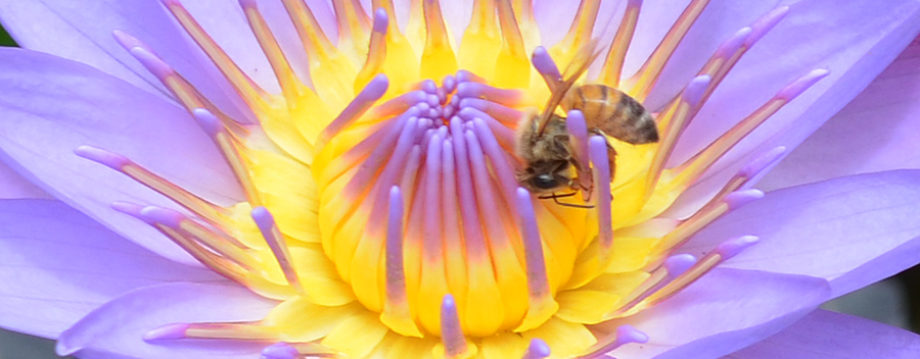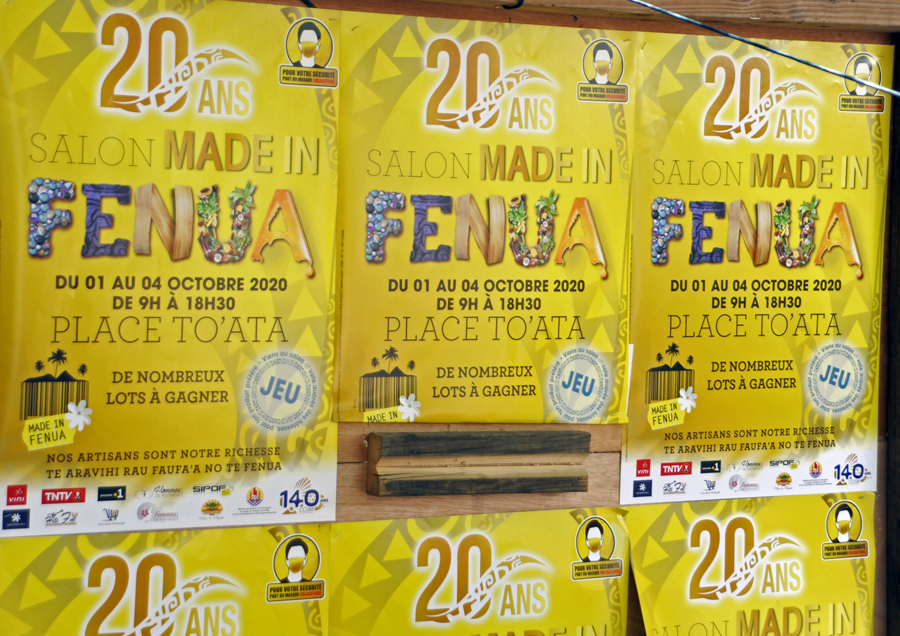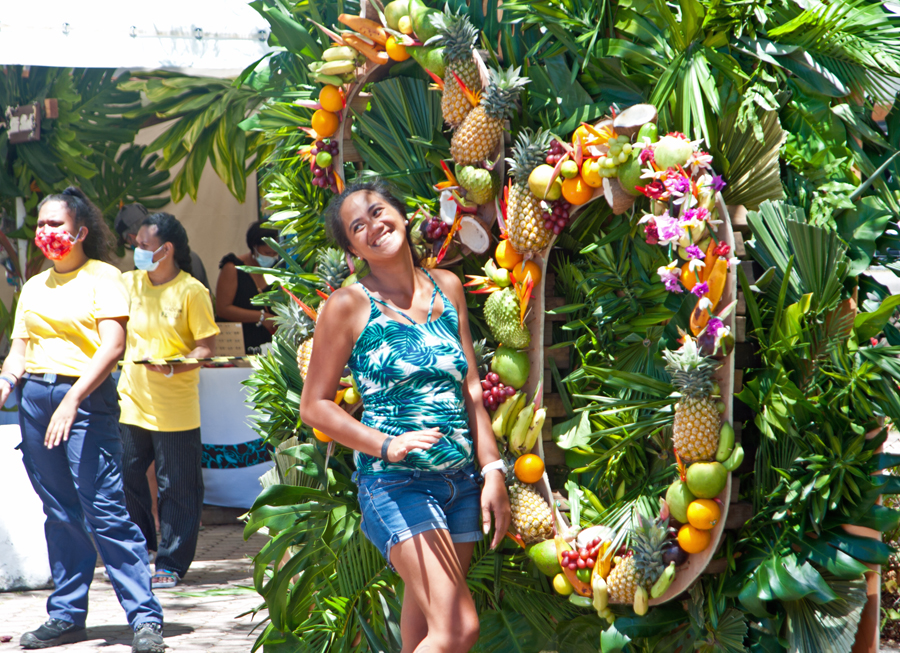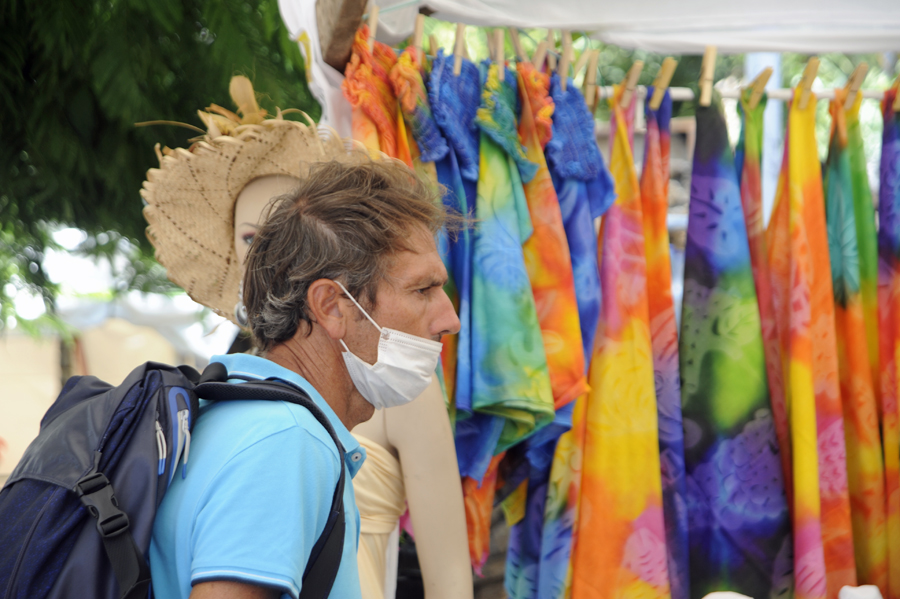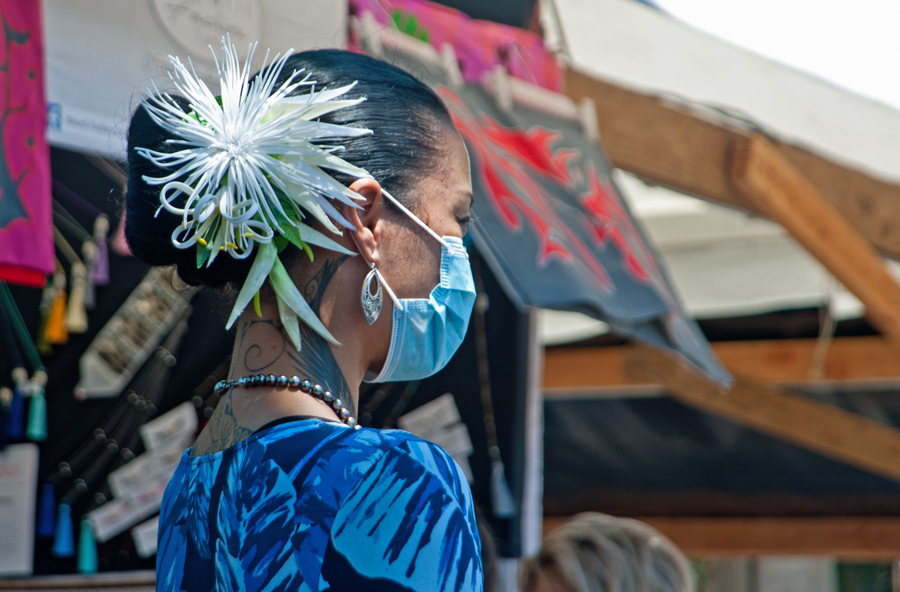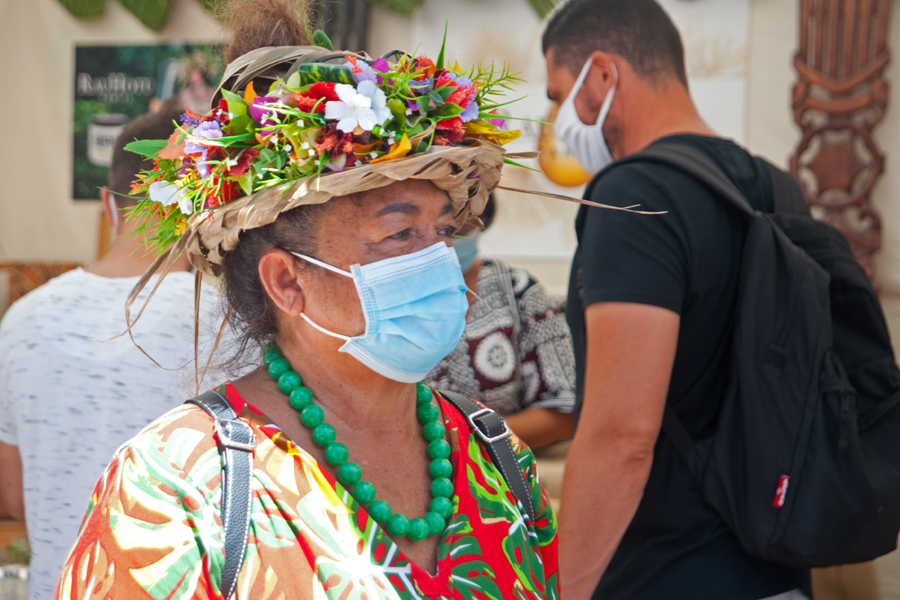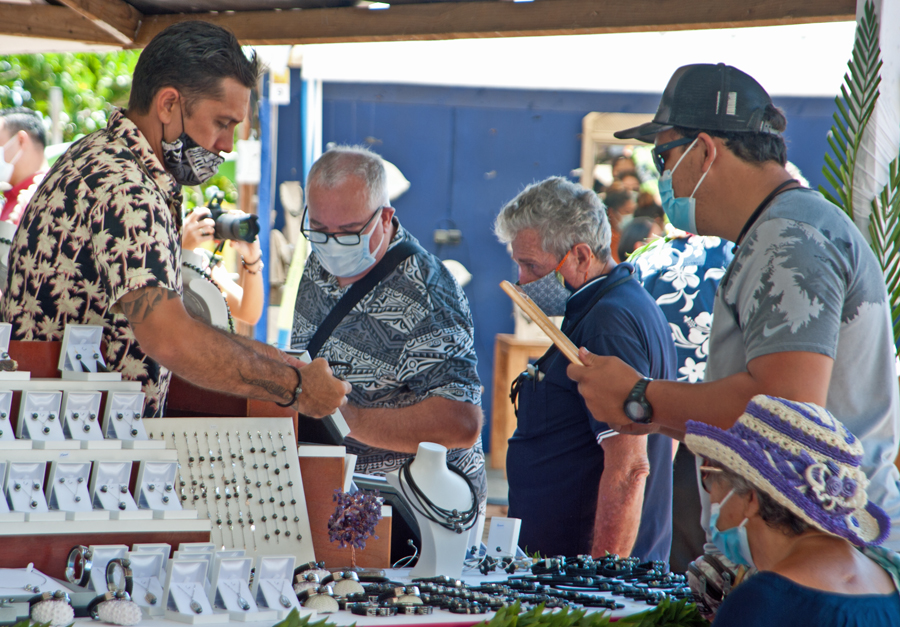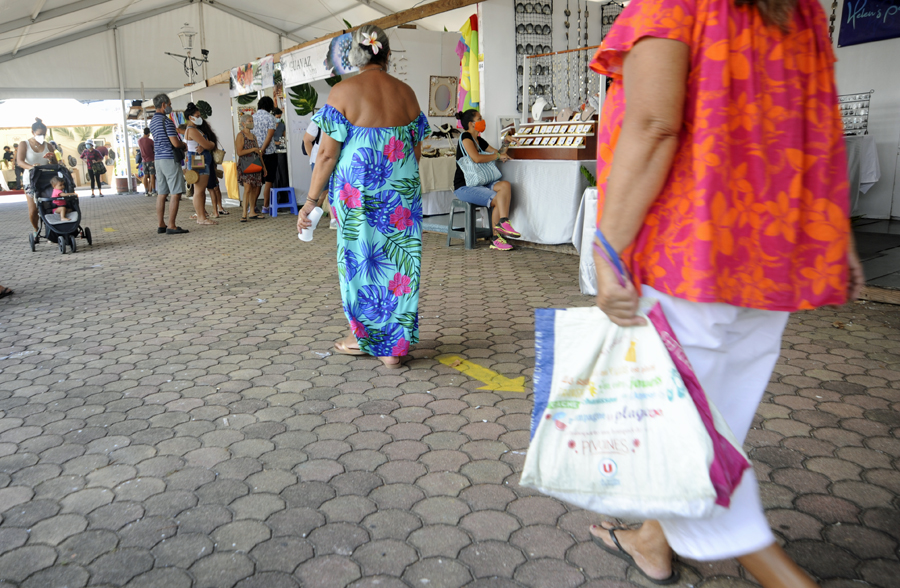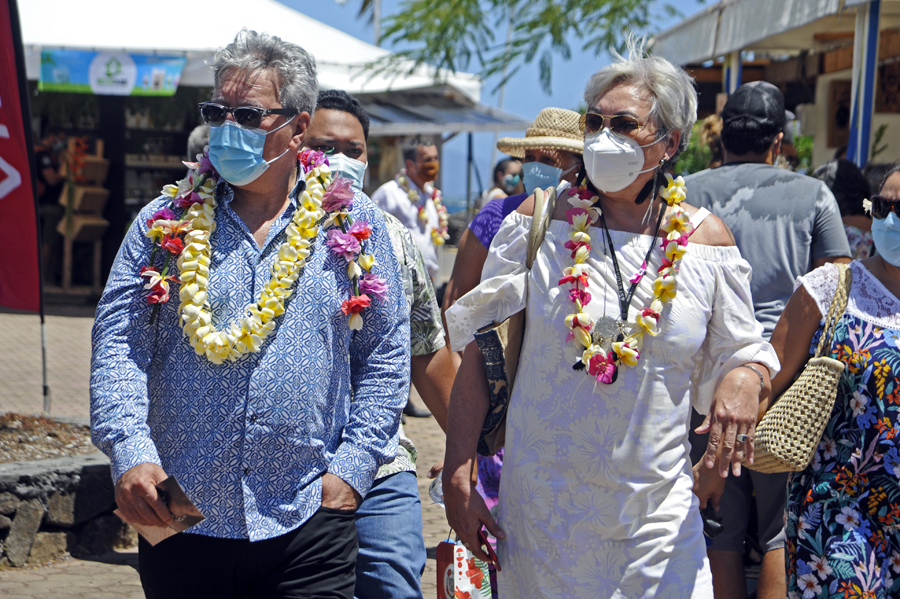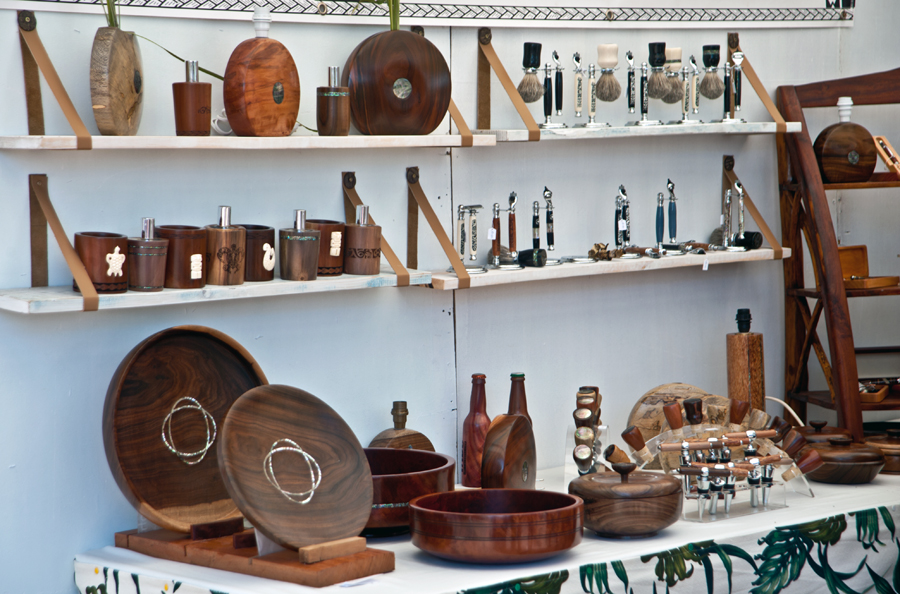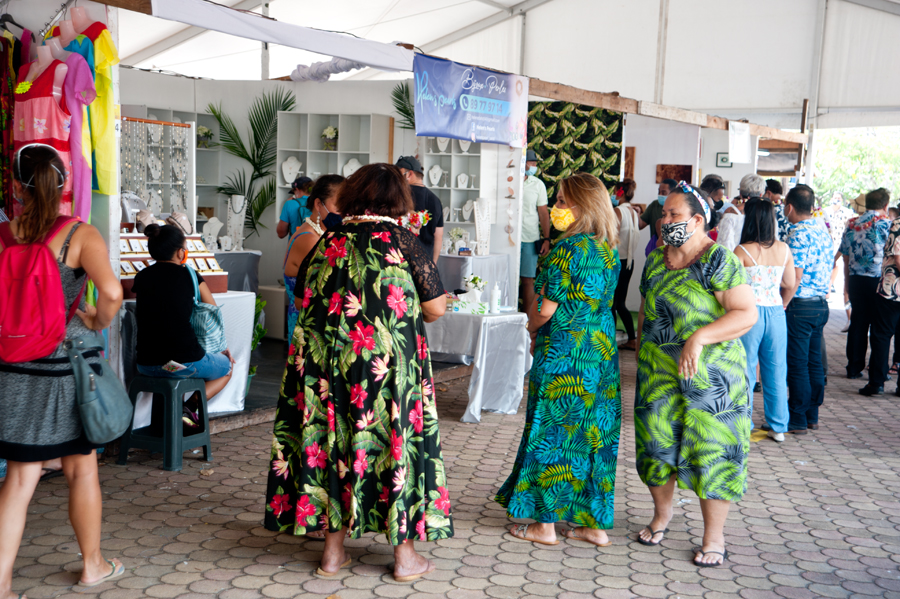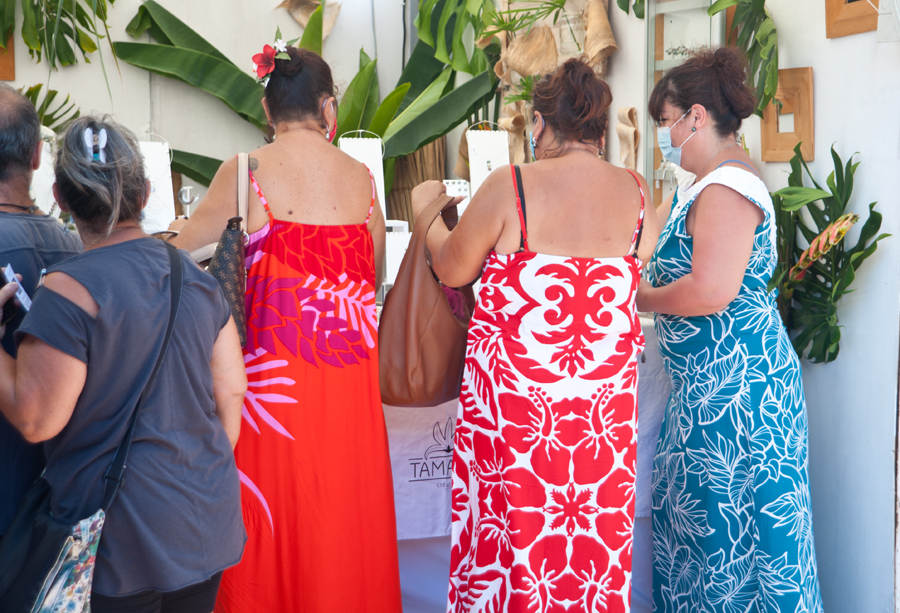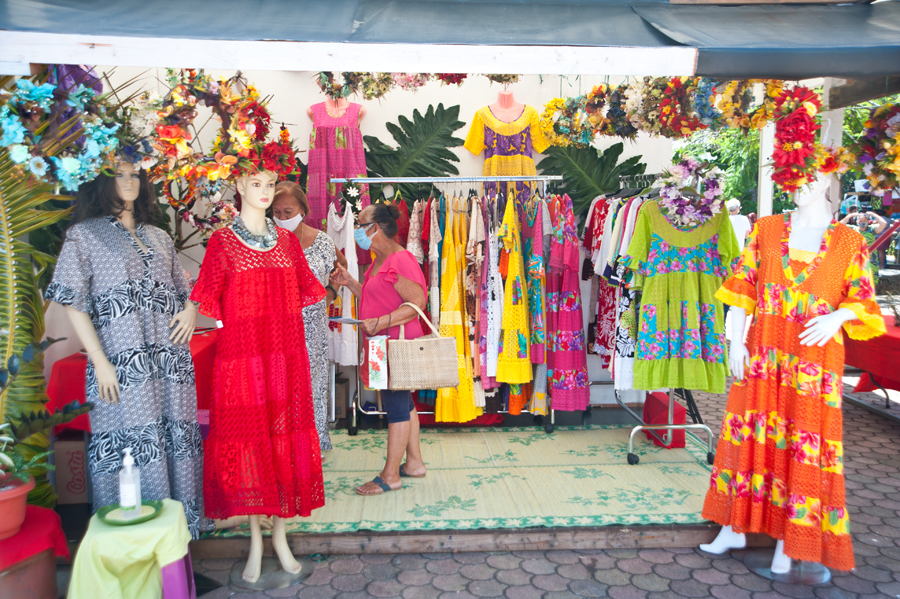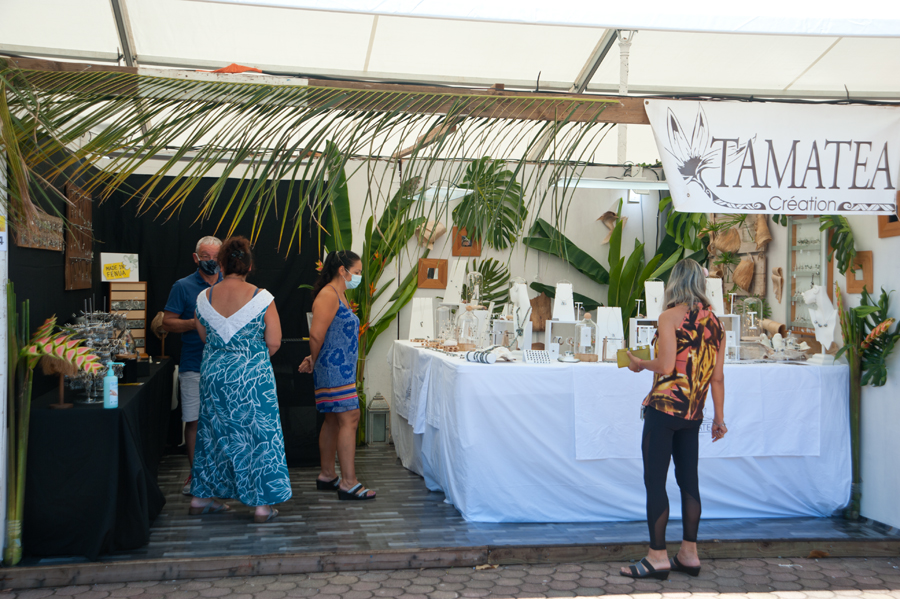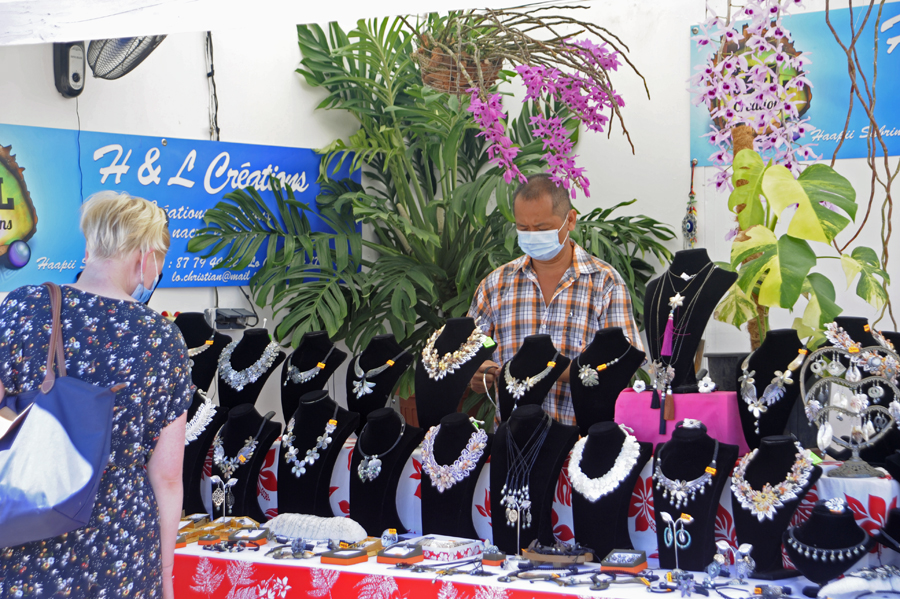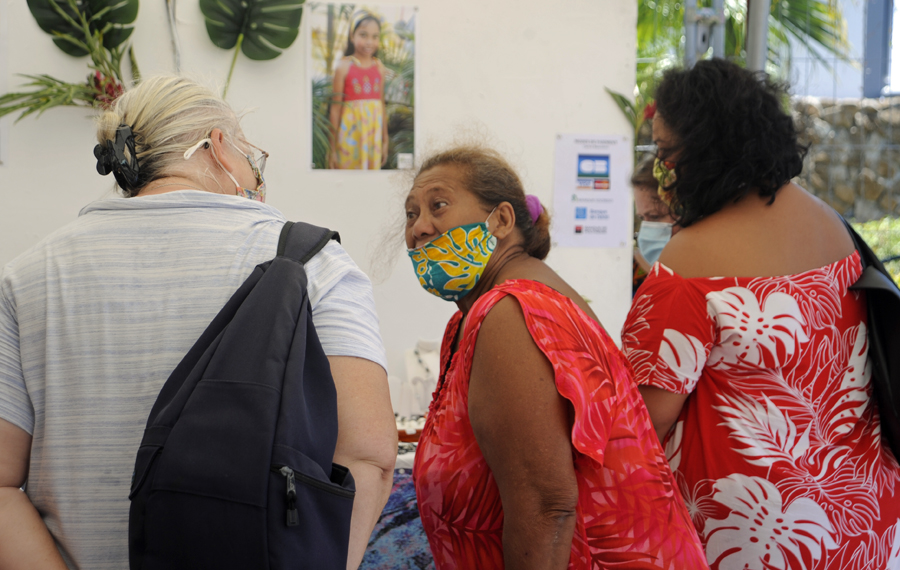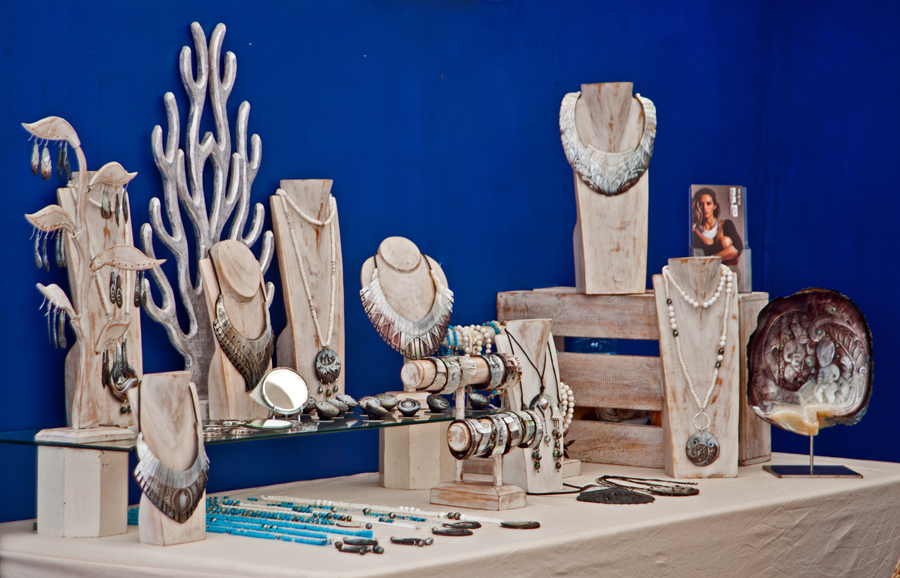Regular readers of this blog already know we love street markets. Portland Oregon in the USA and Buenos Aries in Argentina are still favorites. I just looked at the pictures we took at these markets and reminisce to the good ol’ days of people not social distancing or wearing masks. If the markets have street entertainers, better still. I love food and craft markets equally as much. And best of all, we love to take our SLR cameras so we can capture the activity. In French Polynesia, I especially enjoy capturing the vivid colors. This is perhaps the most colorful place we’ve been so far. People here really like bright colors.
So, speaking of people wearing masks, let’s play a game with this post. See how many people you can spot in my pictures wearing a mask that doesn’t cover their nose. I had a good laugh recently when someone sent us a meme that said, “Now I have observed people wearing masks, I understand why condoms are not effective for everyone”. Let the games begin. Here’s a couple of easy ones to start with.
Flowers are an important part of Polynesian culture. As I sit in the mornings in Cream Puffs cockpit sipping tea and doing the daily crossword, I see pedestrians walking past on the promenade. Women often stop at a flowing tree, pick a single flower, and place it in their hair or behind their ear. Flower reefs worn on the head are not done just for tourists. It doesn’t really have any meaning as to how you wear flowers, it is just a nice thing to do. I captured this picture of an especially exotic flower in this lady’s hair. The contrast of the flower and the dark hair, I thought was very cool.
This particular market is the 20th annual event. Vendors come from small atolls and surrounding islands to peddle their wares from local artisans. Often on the booth, a sign is posted designating the location where the merchandise is made and by which locals. Made is Fenua is the theme of the market. Fenua is the Polynesian word for Polynesia. No made in China souvenirs being sold here.
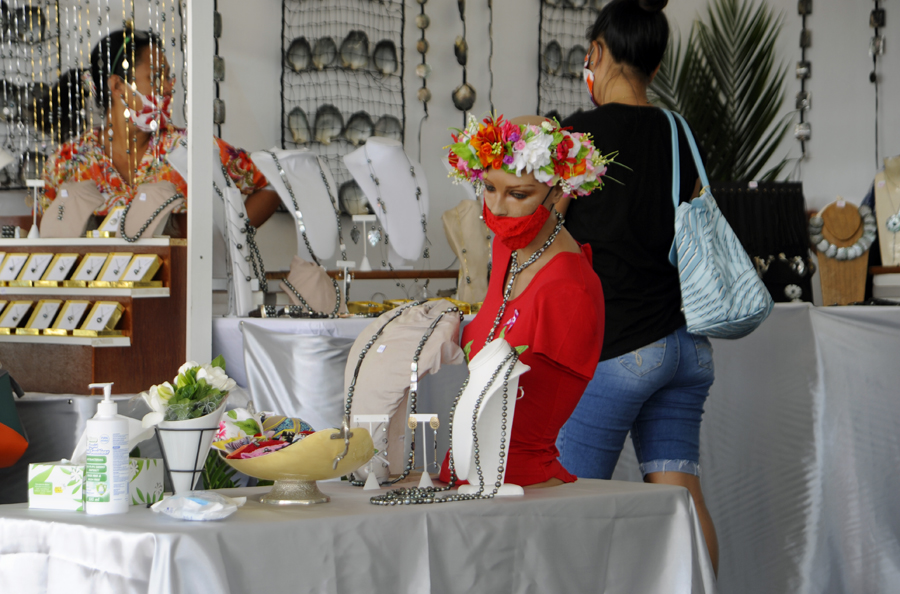
Hand gel and wipes are available at most booths as shown on this table – look at the mannequin – look closely 🙂
To address the elephant in the room post, why are we having an event like this during COVID. Firstly and foremost, I am very impressed with the government of French Polynesia and its handling of the virus crisis. When news of the outbreak first started to spread about the world back in February, like many countries this one closed. Being an island, closing is a little bit easier than being surrounded by other countries and open borders like those in Europe. Once the airport was shuttered and tourists were sent home, the focus was on containment and elimination of the virus. This is when we arrived here.
The government allowed boats already in transit to continue to arrive even after borders were closed. A very level-headed decision since we’d been at sea for 28 days in transit from a COVID-free country. I’m pretty sure they did not see us as a threat. It would have been easy for the government to shut the border to private yachts in addition to the airport. We are grateful every day they decided against this.
At one point, the entire country of French Polynesia was rid of the virus due to its quick as swift policies. As with many countries, this came with a massive blow to local businesses. In April, once the island was completely free of COVID, all restrictions were lifted and life returned to normal. Well, as normal as it can be without the tourism industry.
We move Cream Puff into the downtown marina and watched as the city slowly came back to life. For a few weeks, we could enjoy Tahiti with no other tourists. Imagine having an entire beautiful vacation spot all to yourself. As we ventured out, the locals were curious about how we were on the island. Once we tell them we live on a boat, this starts a whole lot of questions about our lifestyle, where we’ve been, and where we’re going. Local friends are quickly made. In a few restaurants, we started to visit during this time, we quickly became known and recognized. Last night I went to get a pizza to go and the lady in the parlor already knew what I wanted before I could tell her. The same is true for many businesses we frequent. Being so conspicuous during the no-tourists time has built some lasting relationships.
The government, knowing it couldn’t sustain an economy without tourism, especially when the industry here is based on tourism, had to make some extremely difficult decisions. They re-opened the airport on July 15th and welcomed tourists so long as they tested negative for COVID 72-hours prior to the flight departure. Tourists are re-tested again 4-days after arrival. No quarantine period is required. A COVID-free destination without social distancing or a need to wear masks is a massive appeal for people looking for an escape. Then the unthinkable happened.
A group of French civil servants arriving in Tahiti from France arrived as part of a rotation of government jobs. They went to a restaurant and had a big party on their first night here. They shared food and drinks. A person in the group had COVID. Within a few days, hundreds of cases started to show up on the islands. Some of the group went on to a large gathering and BBQ the next day. The President made a speech. It was obvious in his face how angry he was at these young newly-arrived government employees. But alas, the damage is done. Does he close the island again?
Is it possible closing the economy again would hurt a person without a job who is dependent on an income to support their family more than the virus itself will hurt? At this point, scientists are starting to understand more about the virus, how it is spread, and the true mortality rate. French Polynesia made the very difficult decision to stay open. Masks are required in certain areas where social distancing can’t be maintained and on all public transportation, shops, ferries, etc. Tourists are still welcomed but now need to comply with mask-wearing.
In places like parks, less crowded streets, or beaches where social distancing can be maintained, masks are not required. This makes perfect sense when you think about it. Why should wearing a mask be mandated if no other people are close in proximity? Again, sound reasoning from the local government.
So how do I feel about living on an island with positive cases of COVID? The answer is: I feel very safe indeed. Let me explain why. There are about 350 active cases of COVID right now on Tahiti (that we know of). The population of Tahiti is about 170,000. This means I have a 1/5th of one-percent chance (0.2%) of coming into contact with a known infected person. This percentage is assuming they are not self-quarantining and are out and about, which is not the case. The chances are even less.
The cases here are expected to rise and peak in January according to the epidemiologists on loan from France. Even if the active cases reach 10,000, I would have to have 17 people openly come within three feet of me and cough on me with no mask before I might get the virus from one of them. And yes, I know this is a highly contagious virus and it could take less than just being coughed upon. Should it happen I get COVID, and I’m really hoping I don’t, in my age group I have a 3% chance of dying. Or, a 97% chance of living. And, there are additional things I can do to protect myself to better my odds.
What are the additional things? It has already been proven by front line responders, wearing a mask, frequently washing hands, and avoidance of touching ones face with unwashed hands drastically reduce the infection rate of COVID. The odds are overwhelmingly stacked against me getting COVID, for now. But as we know things change so, I’ll never say never.
To help put the numbers into perspective for you: my odds of dying from COVID today here in Tahiti are about 1 in 21,250. My odds of dying at home in the USA by falling off the sofa are 1 in 4,238. I have a five times greater chance of death by sofa than death by COVID. People close to my age group in the USA dying because of furniture related accidents are the 18th cause of death in the US. I swear, I am not making this up. Here, see for yourself: (link). I’m just looking at the numbers and being realistic.
“Beds, couches and furniture exist in our homes to provide personal comfort and relaxation, but they are associated with death far more often than most would think. Falls are the leading cause of death among people over the age of 65. A person is far more likely to die falling out of bed, a chair or other furniture at home than traveling on a railway, where the odds are 1 in 225,879.”
This brings me back to attending an open-air market where almost everyone is wearing a mask correctly. I feel pretty good I’m going to live to see tomorrow. An awful lot has been learned about the COVID virus since country’s principals were briefed earlier this year. The Government here constantly adjusts policies as more accurate information is obtained. For example, they just lessened the quarantine for those infected period base on new information from WHO. We have learned the virus is not near as deadly as it was first thought to be. No, it is not pleasant to have. And yes, a lot of people have died. However, if I were a young person with a family to support, I would be of the mindset, just infect me let me recover from it so I am immune and can go on with my life. The French Polynesian government agrees with them.
On the other hand, the French Polynesian government is on a massive campaign to protect “fragile” people. This is inclusive of the elderly population and people with conditions where the virus will exhibit a higher fatality rate. Many younger people have grandparents living in the same house. They are being taught how to protect them. I have personally observed young people giving the elderly a broader space when passing. One of the official’s concerns about the virus is the number of people needing medical attention.
Large hospitals on Tahiti are very capable of treating COVID patients. However, just like anywhere else in the world, there are capacity limits. Because of these limits, the virus situation is constantly monitored by the Health Department. No doubt, predictions are being made regarding the infection rate and those needing or will need hospitalization. So long as the mortality rate is low and the hospitals can cope, let life go on. Perhaps the biggest concern for the Health Department is an outbreak on an outer island or group of islands where medical treatments are limited. Additional preventive measures are in place for cruise ships traveling to the outer islands. The cruise ship industry here is off to a bit of a rocky start. But that’s a whole other story.
One of my favorite phrases was made famous in the United States by Ronald Reagan when he used a Russian rhyming proverb, “Trust, but verify”. I feel today in French Polynesia we should have a similar saying addressing the virus and our current lifestyle here, “Live freely, but be cautious”. I am doing this now enjoying my camera and a day at the market. While Cindy shops, I take in the colors.
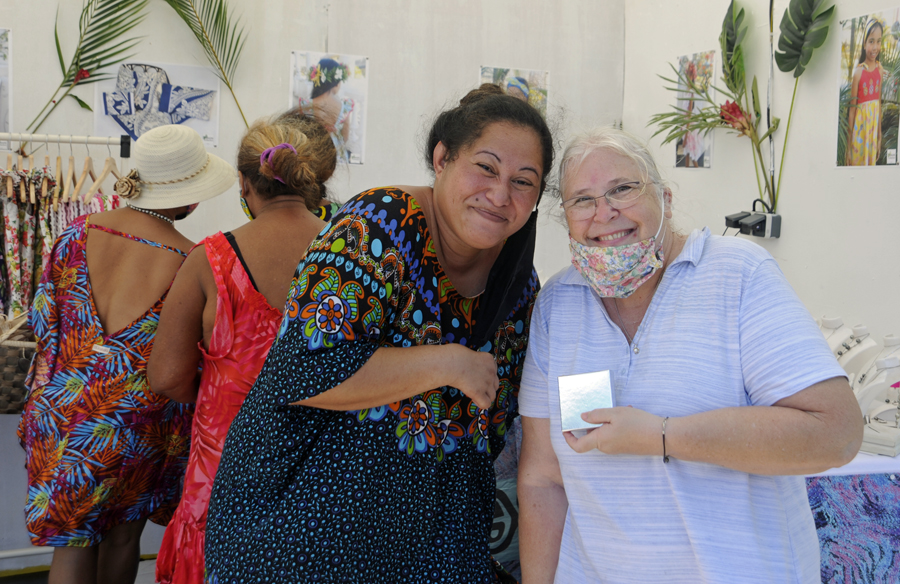
A deal is made for a Christmas present – Remove the mask, hold your breath, say cheese. Masks back on, please. Thank you!
